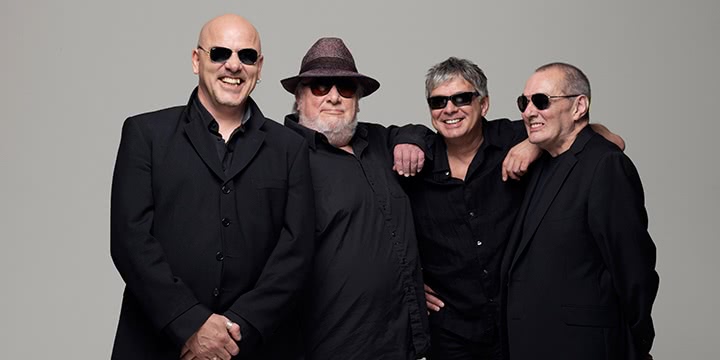Iconic UK rock band The Stranglers last visited Australia in 2012.
That tour saw them playing alongside old contemporaries Blondie, and many fans speculated it’d be their last visit to Australia.A similar sense of finality surrounded The Stranglers’ 2012 record Giants –it was just the second album they’d made following the departure of vocalist Paul Roberts, and it arrived six years after their previous LP, Suite XVI. However, having continued to perform with reasonable regularity over the last three years, they’re headed back to Australia this week.
The BRAG speaks to bassist and co-vocalist Jean-Jacques Burnel, who’s quick to silence whispers about the band’s impending conclusion: “Why on Earth did you think it was going to be our last visit to Australia?”
Two other original members join Burnel in the band’s current formation: drummer Jet Black and keyboardist Dave Greenfield. Guitarist Baz Warne entered the picture in 2000 and has been sharing vocal duties with Burnel for the last ten years. Black’s health has long been a point of concern, as he suffers from a chronic heart problem that inhibits his ability to perform. The band members previously intimated they’d stop touring if Black couldn’t continue, but the fact Jim MacAulay is handling drumming duties on this tour shows they’ve since settled on a compromise.
“[In 2014] on our UK tour Jet played four numbers on the first night, two on the second and needed oxygen on the third,” Burnel says. “Throughout [2015] he has been absent, although he certainly has an opinion and input on all things Stranglers. How many drummers do you know approaching 80 years old that play in rock bands?”
While the other band members are several years younger than Black, The Stranglers have managed to outlive the vast majority of acts they came up with in the late ’70s UK punk scene. The Stranglers are still regularly referred to as a punk band, and their irreverent attitude certainly corresponded with the initial mood of that movement. However, they soon began to look further afield, moving away from the simplicity of punk rock and exploring lyrical themes that weren’t purely anti-establishment. The Stranglers could be seen to represent the fact that punk wasn’t so much a sound as a way of thinking, but Burnel says they felt no allegiance to any particular school of thought.
“I agree that it was originally a way of thinking, although a form of suffocating fundamentalism hijacked it and put blinkers and rules on it and it no longer corresponded with our way of thinking,” he says.
The Stranglers’ disillusionment with punk by no means impacted on their creative drive. With the release of their debut LP Rattus Norvegicus, the band entered a ten-year period of staggering productivity, releasing nine albums between 1977 and 1986. Their next record didn’t come until 1990, and it was the last to feature founding guitarist and vocalist Hugh Cornwell. Cornwell’s exit could well have spelled the end for The Stranglers, but while they never regained the efficiency of their early years, the Brits have released a further seven LPs. With each new release, they’ve stayed intent upon positively expanding their oeuvre.
“The problem is to do with quality control,” Burnel says. “I have at the moment about 150 different ideas that I need to make sense of. That takes more and more time, especially in view of the worldwide demand for the band and our love of playing live. Also, the last thing I want is to start plagiarising ourselves.”
The Stranglers’ back catalogue is indicative of the band members’ eclectic tastes. Their best known song is ‘Golden Brown’ from 1981’s La Folie; a pastoral waltz that’s a far cry from the snarling, bass-driven pub rock of their debut. Their discography also includes forays into art rock, new wave and tidier pop songwriting.These days, meanwhile, their influences are more internal. “There are loads of things that I hear that I would be influenced by,” says Burnel, “but very often we fall short of being able to do them justice or interpret them in a credible way.”
Despite experiencing multiple lineup changes and executing wide stylistic exploration, The Stranglers have retained a core sound. This was true of Giants, which found the band’s dry sense of humour and dynamic unpredictability fully intact. The Stranglers’ creative field mightn’t be as wide open as it was in the early days, but the rewards are no less vital.
“The whole process of preparing an album is, for me, cathartic and very pleasurable,” Burnel says. “I don’t think, at this stage, I would want to work on a record if it just meant going through the motions.”
For Burnel and his Stranglers associates, playing in this band has long been a professional responsibility. At this point in time, it’s no longer necessary for them to continue touring, especially to such far-flung places as Australia and New Zealand. But finance has nothing to do with their interest in getting up onstage.
“There is a need to play. There is a need for that communion with people, an audience. As a band, we really love each other’s company. The material is really enjoyable to play.”
The Stranglers play Metro Theatre on Sunday April 17.

































